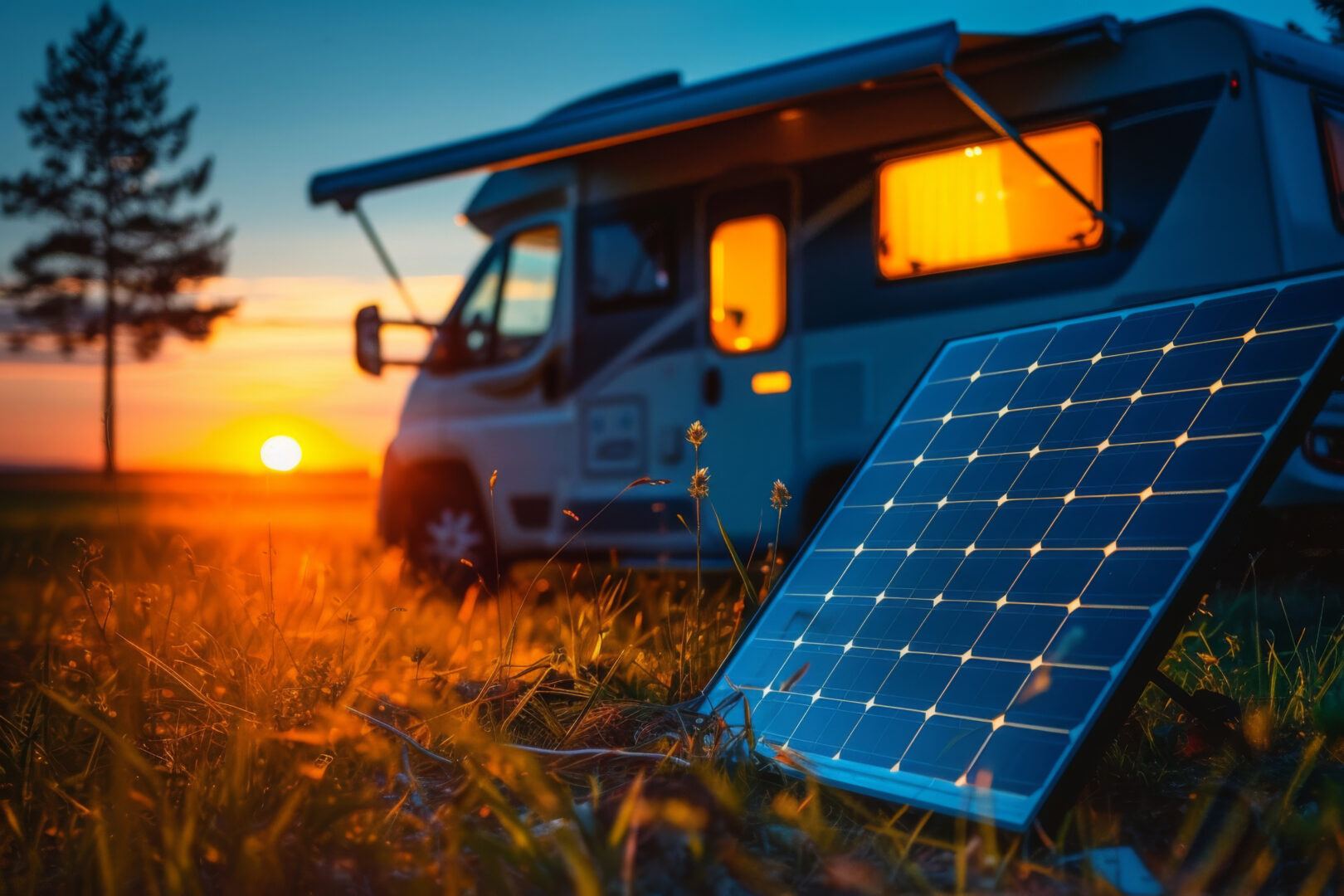Eco-Friendly Tips for Sustainable Motorhome Travel
Posted: 08/11/2024 Author: Jackie ShipleyTags: eco-friendly, motorhomes
You can’t turn on social media without coming across someone talking about the state of the planet. In fact, it’s become an increasingly large part of the global agenda, as people wake up to the realisation, they can contribute to a more sustainable way of life. It’s clear that the need to travel in an eco-friendlier way is really important – particularly for those who enjoy the freedom of motorhome travel.
From fuel efficiency to the management of waste, there are numerous ways for motorhome travellers to ‘go a bit greener’ and embrace a more conscious lifestyle. In this edition of our blog, we’ll offer some practical tips to help you travel more sustainably, while still getting the most out of every journey.
Why sustainable Motorhome travel is important
Motorhomes offer the opportunity to travel comfortable to new and unusual places and are a unique way to get yourself closer to nature – but without mindful practices, motorhome travel can have a substantial footprint caused by everything from emissions to the use of energy and water. By taking onboard more eco-friendly behaviours, you can reduce your impact – and, in fact, connect more profoundly to the natural world you’re exploring.
Eco-friendly Motorhomes
Many newer motorhomes are equipped with fuel-efficient engines, which means that they consume less fuel and cough out fewer emissions. Some companies now even offer electric or hybrid motorhomes, with emissions drastically reduced, particularly on shorter trips where there is a charging infrastructure available. Although this industry shift towards fully electric motorhomes is steady, the UK government currently has a stated target of 2035 for prohibiting the sale of new fossil-fuelled vehicles. As we head towards that deadline, hybrid models offer a decent middle ground.
If upgrading to a brand-new eco-friendly motorhome is not possible for you, there are other ways you can contribute to the sustainability movement. Regular maintenance of your motorhome (eg. keeping the engine tuned, checking tyre pressure, replacing air filters etc) can improve the vehicle’s fuel efficiency and reduce its emissions. Behaviour also plays its part.
Drive efficiently
Driving habits significantly influence your motorhome’s consumption of fuel. This type of vehicle is generally heavier and less aerodynamic than a normal car, so fine-tuning your driving style can go a long way towards saving fuel.
- Pace: By driving at a steady pace, you’ll avoid sudden accelerations and braking, conserving fuel and reducing the wear on your motorhome.
- Route planning: By mapping out the most direct and efficient route to the place that you’re heading for, you can cut out unnecessary detours, reducing travel time and, therefore, emissions.
- Idling: When your motorhome is stationary for long periods of time, the simple act of turning off the engine (ie. not idling) is a simple but effective way to reduce your emissions.
- Weight: The weight of your motorhome (including its load) increases fuel consumption. When you’re going on trips, only pack what you need. Avoid carrying unnecessary items, especially if they’re heavy.
Driving efficiently is not only of benefit to the environment but it also reduces your costs, so you’ll be able to travel further on less fuel.
Solar power
The ability to live ‘off-grid’ is a great benefit to motorhome travel. To be as sustainable as possible, use solar power to meet energy needs. Many models now come with a solar panel (or panels) pre-installed – but, if not, installing solar panels on the roof is a great way to go eco-friendly. Portable solar panels are widely available and can be a flexible solution.
Although having solar panels fitted requires an initial spend, they will pay you back. They will provide you with some onboard power and can also significantly reduce reliance on campsite hook-ups or generators (which are often powered by fossil fuels). Solar power allows you to generate electricity for lighting, cooking and charging devices.
Water use
Across the planet, water is a very precious resource. In a motorhome it’s important to be careful over how much you’re using.
- Showers: Most motorhomes are fitted with showers, and just like back at home it’s a pleasure to stay in there singing. In other words, you’ll use too much water if you’re not careful. You could turn off the water while soaping, then turn it back on again to rinse yourself off.
- Low-flow showerhead: Making this small upgrade can help you reduce water usage quite significantly without sacrificing in-shower comfort.
- Cleaning products: Many of the household cleaning products we regularly use contain chemicals that are harmful to the environment. This is particularly so for motorhomers, if greywater is disposed of improperly. You should always opt for biodegradable soaps and cleaning products that are safe for you and for the planet.
By conserving water, you’ll not only extend the amount of time you can spend off-grid in your motorhome, but you’ll also reduce your impact on local water sources, especially if you are in an area that is experiencing drought.
Zero waste
One of the best things you can do to travel sustainably in a motorhome is minimise waste. This means reducing plastics, managing waste responsibly and recycling wherever possible.
- Reusables: Stock your motorhome with reusable water bottles, shopping bags and containers. These will help to reduce single-use plastics.
- Shop sustainably: Whenever possible on your motorhome trip, support small businesses and local farmers. Buying produce that is locally sourced will reduce ‘food miles’ – ie. the distance from production the table, often involving fossil-fuel travel and therefore an environmental cost. Local produce often also comes in much less or more appropriate packaging.
- Waste: Make use of the recycling facilities at the campsites you stay at or make the effort to find local recycling centres along your journey. Keep separate bins for recyclables and compostables as this will make it so much easier to manage waste on the road.
- Disposables: Use utensils, plates, and cups that you can wash up, and avoid using disposable versions of these things.
By practising these zero waste habits, you’ll contribute less rubbish to landfills, reduce plastic pollution and lessen your environmental impact.
Respect nature
One of the real joys of motorhome travel is that it often takes us to places where there is an abundance of wildlife and natural beauty – but it’s extremely important to remember that we’re mere visitors passing through these environments. Being truly mindful of wildlife and natural habitats is key to serious sustainable travel.
- Leave no trace: Take all of your rubbish with you when you leave and avoid doing anything to disturb natural features or habitats. These are important to the ecosystem and the wildlife that (hopefully) is thriving there.
- Wild camping: While wild camping can be appealing, always make sure you’re in permitted areas. Don’t ever wild camp in prohibited or protected areas. Restrictions that are in place might initially seem nonsensical to you, but they will be in place to safeguard wildlife and habitats.
- Noise: Excessive noise can disturb wildlife. Try to minimise your ‘audio impact’ by keeping the noise you generate to a minimum, especially when you’re in a remote or ecologically sensitive area.
By respecting wildlife and habitats, you’re helping to maintain the ecological balance and preserve natural beauty in these places, and future visitors will be able to enjoy them as they should be.
Eco-friendly campsites
Going online to research and picking eco-conscious campsites to stay at can make a big difference in lowering your environmental impact. Many campsites use sustainable practices (waste recycling, water-saving systems, renewable energy sources) and so look for these demonstrated commitments to being eco-friendly.
Wastewater disposal
Disposing of your motorhome’s wastewater properly is essential for your travel to be sustainable. Both greywater (sinks and showers) and blackwater (toilets) need to be disposed of responsibly to prevent pollution of soil and/or natural waterways.
- Disposal points: Most campsites provide designated points for wastewater disposal. Never dump wastewater in undesignated areas.
- Products: Using eco-friendly soap, shampoo and cleaning products means that any residual chemicals in greywater are biodegradable and therefore less harmful to the environment.
Be responsible with wastewater disposal and you are helping to protect ecosystems and maintain the cleanliness of the areas you visit.
There is sometimes an argument, about sustainability, along the lines of ‘why should I do it if no-one else is?’ – but this solipsism just doesn’t stand up anymore. As we mentioned at the start, there’s no avoiding the fact that being aware and eco-friendly is important. Thankfully, more and more motorhomers are enjoying responsible and intelligent eco-friendly travel. By by following the tips we’ve provided in this edition of the Coachman blog, you can ‘do your bit’ too.


